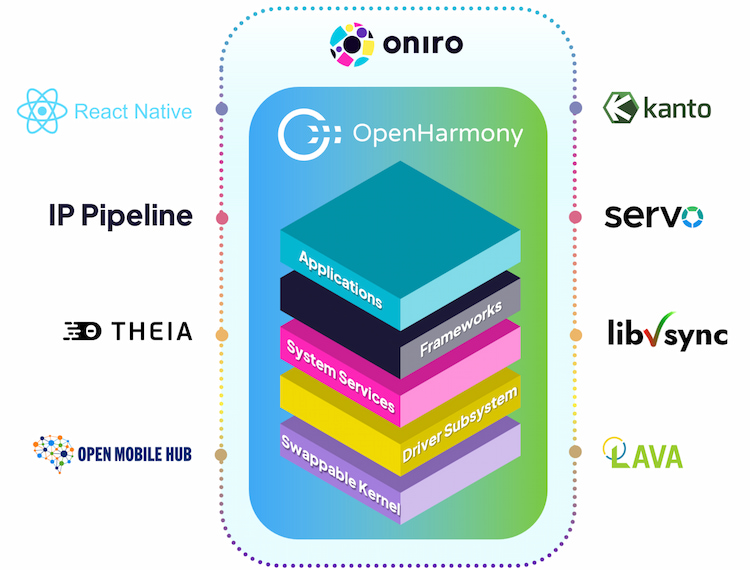The Oniro Platform
Oniro is an Eclipse Foundation Project dedicated to the development of an open source vendor-neutral Operating System (OS) platform. The Oniro Project was established through a collaboration between two global open source foundations: The Eclipse Foundation and The OpenAtom Foundation. Leveraging the solid foundation of OpenHarmony, an open source project operated by the OpenAtom Foundation, Oniro builds upon an operating system platform known for its versatility across a wide range of smart devices.
At its core, Oniro prioritizes seamless interoperability, modularization, and a visually appealing user interface. These priorities are realized through an array of enhancements, encompassing application frameworks like React Native, system-level OS components such as Servo Web Engine, and a comprehensive toolchain that ensures intellectual property compliance and licensing. This adaptable platform provides robust support for a broad range of global technologies and applications spanning various industries, including Consumer Electronics, Home Appliances, Industrial IoT devices, Smart Home, and Multimedia.
The Oniro Architecture at a High Level

The Eclipse Oniro architecture builds on the solid foundations of OpenHarmony, enhancing and expanding its capabilities. All system enhancements are rigorously managed by an advanced IP toolchain to ensure compliance throughout the development process. Within this framework:
- React Native extends the usability of existing applications and ecosystems on top of OpenHarmony, enabling seamless integration across platforms.
- Eclipse Kanto expands Oniro's ecosystem adaptability and scalability by empowering edge devices with advanced IoT functionalities, including seamless cloud connectivity and flexible device management.
- The incorporation of the Rust language, particularly for the Servo web engine, bolsters the overall system's safety and security.
- Eclipse Theia enhances the development workflow, simplifying application creation within the ecosystem.
- libvsync improves the performance and reliability of applications that require precise coordination across multiple processes.
Future enhancements will include the integration of NearLink, offering an alternative to Wi-Fi and Bluetooth with lower latency and improved connectivity, particularly suited for automotive and industrial environments.
The Oniro Working Group
The Oniro Working Group is made up of organizations that support the development and evolution of the Oniro platform, all working together to drive its commercial success across a broad range of industries. This ecosystem can only be achieved through a vendor-neutral environment where collaboration is promoted under core Eclipse Foundation principles, such as transparency and openness. Read the charter.
Read the Membership ProspectusAre you interested in Oniro?
Contact us to find out how you can get involved in this working group.
Supporters
We, at the OpenAtom Foundation, know that we will allow our partner, the Eclipse Foundation to build and develop the next-generation all-scenario open source OS, and expand the OpenHarmony ecosystem. We are looking forward to making history with the Eclipse Foundation and developers around the world.
Eclipse Oniro is transforming the landscape of open-source collaboration. Built on OpenHarmony, it is the result of a unique partnership between two leading open-source foundations - Eclipse and OpenAtom. Oniro maintains a vendor-neutral foundation, offering a transformative opportunity to unify global innovation while respecting the needs of diverse markets. With its seamless multi-device integration and unwavering commitment to interoperability, Oniro is laying the groundwork for a truly connected, open future.
Oniro is creating an environment to foster collaboration among experts in industry and research. That is also one of our goals - among others - at NOI Techpark. Through the Free Software Lab, we contribute to the project by activating our network of experts in the field of Free Open Source Software, particularly for Open Source Compliance Policy and Strategy. We recognise Oniro’s potential to create an open and sustainable environment, enabling talents to create innovative solutions.
Oniro will enable a more flexible and powerful interaction between personal, IoT, and edge devices we are surrounded by. Politecnico di Milano is investigating new artificial intelligence methods to enable interaction, coordination, and cooperation within this ecosystem of autonomous computing devices, to seamlessly form a smart environment in which the resources can be shared and integrated to satisfy the needs of applications and users.
TypeFox is excited to be part of the Oniro Working Group to help shape the future tooling for the open-source OS. Being the creators of the Eclipse Theia IDE, among other open-source projects at the Eclipse Foundation, we're bringing our expertise to the Oniro community to enhance the developer experience. The Eclipse Oniro project aligns perfectly with our passion for open source and crafting developer tools. We look forward to the journey ahead.
Bosch has been a driver for an open-source based approach in IoT for many years. We believe that both Eclipse Oniro and Eclipse Kanto projects can be a gamechanger to overcome the rising fragmentation in the development of new IoT devices/solutions. We are looking forward to actively participate in the Oniro working group to help address the technical challenges as well as to advance mass market adoption.
Based on a European open source effort, Oniro has the opportunity to play a key role at the intersection of Rust programing language and automotive applications. Oniro’s multi-kernel Operating System provides unparalleled flexibility and real-time capabilities for IoT-driven automotive ecosystems. Its modular architecture ensures seamless integration of devices, enabling vehicles to be smarter, safer, and more connected. We look forward to our continued support for application development and framework integration in this regard.


